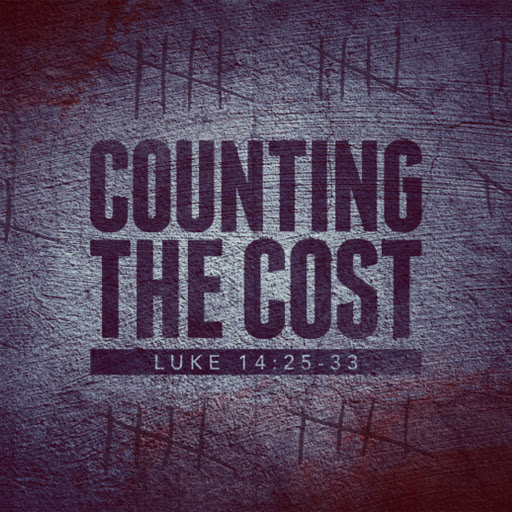
What is the price?

And whosoever doth not bear his cross, and come after me, cannot be my disciple. For which of you, intending to build a tower, sitteth not down first, and counteth the cost, whether he have sufficient to finish it?
How do we count the cost?
And when he had called the people unto him with his disciples also, he said unto them, Whosoever will come after me, let him deny himself, and take up his cross, and follow me. For whosoever will save his life shall lose it; but whosoever shall lose his life for my sake and the gospel’s, the same shall save it. For what shall it profit a man, if he shall gain the whole world, and lose his own soul? Or what shall a man give in exchange for his soul? Whosoever therefore shall be ashamed of me and of my words in this adulterous and sinful generation; of him also shall the Son of man be ashamed, when he cometh in the glory of his Father with the holy angels.
All to Jesus I surrender.
Read more...

When Broken is Better

Read more...

Eager to Preach

With All Our Might!
Paul said, “as much as in me is…” that’s passion. Paul had given himself completely to the mission that Christ had given him. Every church has the same mission: going, winning, baptizing, and teaching! Have we given all? Are you willing to give as much as is in you? Our Lord has not asked for little pieces and parts of our lives. Serving Jesus is not about convenience and comfort. We are to serve our Lord and Savior with all our might, offering Him our time…our talent…our treasure…our totality of being so that we might see others rescued from the wages of sin. As J.I. Packer said in Evangelism and the Sovereignty of God, the driving force of this evangelistic zeal is a love of God and concern for His glory, and a love of man and concern for his welfare.
Love for the Lost
Having compassion on those in need is Christ-like. Such compassion should mark us and motivate our evangelism. This certainly marked Paul’s evangelism. He loved Jews and Gentiles alike, and he was motivated to become “weak” if necessary in order to “save some.”
We all know what it is like to share good news with someone (having a baby, been promoted, found a job, got a raise, bought a car, the Reds’ won!). We are excited to share good news with others because we know they’ll benefit from hearing it. We know they’ll like it. So we want to be the one who shares the good news.
Can you imagine being less excited about telling someone the infinitely better news of the Gospel of Jesus Christ? Yet too often I am. How about you?
Love for the Lord
The greatest motivating force for our whole life, including evangelism, must be our love for Christ. Only our love for Him, and more importantly, His love for us, will keep us on track. Ultimately, our motive in evangelism must be a desire to make God’s glory known. When we tell the truth about God to His creation, they benefit and He is glorified!
The call to evangelism is a call to turn our lives outward from focusing on ourselves and our needs to focusing on God and on others made in His image who are still at enmity with Him and in need of salvation from sin and its penalty.
Paul said, “As much as in me is.” Let’s give ourselves, with all our might, to this purpose, with this passion.
Read more...

Do You Know Jesus?

Jesus is a DIVINE Person
- “In the beginning” – That’s eternity
- “with God” – That’s equality
- “was God” – That’s divinity
Jesus is a HUMAN Person
Jesus is the God-Man
- So human He got tired. So divine He said, “come unto Me, and I will give you rest.”
- So human He got hungry. So divine He fed thousands from a boxed lunch.
- So human He got thirsty. So divine He said, “drink of the water that I give, and you’ll never thirst again.”
- So human He cried at a funeral. So divine He raised the dead to life!
- So human He died on the cross. So divine that He rose again three days later and offers eternal life to all.
Ask yourself two questions.
“My sheep hear my voice, and I know them, and they follow me: And I give unto them eternal life; and they shall never perish, neither shall any man pluck them out of my hand. My Father, which gave them me, is greater than all; and no man is able to pluck them out of my Father’s hand. I and my Father are one.” John 10:27-30
Read more...

Now is the Time

The words of the Preacher, the son of David, king in Jerusalem. Vanity of vanities, saith the Preacher, vanity of vanities; all is vanity. What profit hath a man of all his labour which he taketh under the sun? One generation passeth away, and another generation cometh: but the earth abideth for ever. The sun also ariseth, and the sun goeth down, and hasteth to his place where he arose. Ecclesiastes 1:1-5
The Preacher had tried. He thoroughly explored three different avenues of life. He tried the streets of…
Intellectualism
Hedonism
Workaholism
The Preacher explored all these avenues of living and found each of them to unhappy dead-end streets. He ultimately discovered that all his intelligence, indulgences, and industriousness were meaningless under the sun.
That’s the first eleven chapters, and in chapter twelve, the last of the book, he brings his talk to a conclusion by driving home four foundational truths. That will be out focus tonight for the livestream. Here are your viewing options:
- Follow this link to view the livestream directly from our Vimeo page. If you search for our feed on Vimeo use “bbc church.”
- Click the “Watch Video” button on the church’s Facebook page.
- Watch us on Facebook Live
- Watch us on YouTube If you search for us on YouTube use “Bible Baptist Church, Mt. Vernon.”
Read more...

The Day Death Died

Good news for the fearful!
Read more...

All One in Christ Jesus

Galatians 3:28, “There is neither Jew nor Greek, there is neither bond nor free, there is neither male nor female: for ye are all one in Christ Jesus.”
Regardless of ethnicity, language, gender, education level, or socio-economic standing we all are made in the image of God. We also are all equally guilty as sinners by nature, and are all equally and righteously condemned to death. But God in His great love, while we were yet sinners, provided salvation for us all through the death of Jesus and His resurrection from the dead. All who repent of their sins and turn in faith to the risen Christ are equally saved and equal before God. A converted woman remains a woman. A poor person does not become materially wealthy at conversion, but all who come to Christ are received by Him, and the identity and inheritance of all believers is found in the Lord Jesus Christ alone.
Read more...

This Church and This Crisis

The Church as an Institution
The Church as an Assembly
But BBC isn’t Assembling
- Follow this link to view the livestream directly from our Vimeo page. If you search for our feed on Vimeo use “bbc church.”
- Click the “Watch Video” button on the church’s Facebook page.
- Watch us on Facebook Live
- Watch us on YouTube If you search for us on YouTube use “Bible Baptist Church, Mt. Vernon.”
Read more...

This Sunday’s Sermon

- the folly of misplaced zeal,
- the seriousness of discipleship,
- the necessity to deal drastically with your own sin, and
- the fact that we are called to be salty rather than sinful Christians.
“Our Lord’s point is that unless we maintain the purity of our own lives and are purified by the flames of testing, and remain faithful to Christ, our lives will have no preserving influence on this corrupt world. If we begin to fall into the same patterns of life as those which are characteristic of the world, we will never be able to point men and women to another world.”
Read more...
